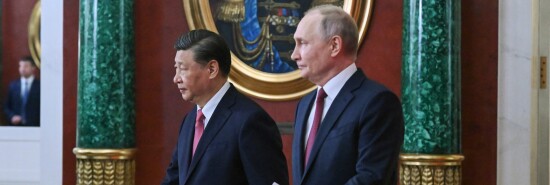
The autocrats are winning
Dan Hannan
At the very moment that Xi Jinping was saying goodbye to Vladimir Putin in Moscow, Japanese Prime Minister Fumio Kishida was arriving in Kyiv. Separated by 5,000 miles of sparse steppes, the Japanese and Ukrainians are drawn together by a shared aspiration for freedom.
Meanwhile, their two great illiberal opponents are drawn together by — well, by distrust of freedom. “Right now, there are changes, the likes of which we haven’t seen for 100 years,” Xi told Putin as he left Moscow. “And we are the people driving those changes.”
It is fashionable to aver that China is playing a clever game, that a weakened Russia suits it, that it is looking several moves ahead. I prefer to take the autocrats at their word. “This is not about Ukraine at all,” said Sergey Lavrov, Russia’s lugubrious foreign minister. “It reflects the battle over what the world order will look like.”
Two months before the invasion of Ukraine, I wrote in this magazine about the intensification of the alliance between the dictatorial duo, who aspired to joint leadership of all those states in the global south that resented American hegemony.
These states are numerous. Fewer than 40 countries have imposed economic sanctions on Russia or sent aid to Ukraine. The “West” turns out to extend no farther than the United States, Canada, Australia, New Zealand, Japan, South Korea, Taiwan, and the European Union. Eighty percent of the world’s countries, with 90% of the population, are sitting this one out.
Some are so steeped in 1950s-style anti-colonialism that they will side against America even when the colonial aggressor is Russia. Some resent the double standard of Western powers that intervened in Iraq, Syria, and Libya. Some, including several democracies that really ought to know better, are prioritizing their immediate parochial interests over everything else.
Israel and Turkey have long self-defined as free countries in a tyrannical neighborhood, yet both have decided that keeping on good terms with Russia is more important than defending the international order. India is the world’s largest democracy but frets that a Russian collapse would leave China even stronger. “India stood its ground, and that ground raised India’s global stature,” said Venkatesh Varma, the former ambassador to Moscow.
Do such nations see no difference between where Ukraine wants to go and where Russia wants to keep it? Between societies where everyone is equal before the law and societies where the people in charge make up the rules as they go along? Between places where the law is open to people seeking redress and places where the law is an expression of state power?
Not for the first time, we are reminded of how counterintuitive Western liberalism is. We are a tribal species, and independent state institutions came about only in places where tribalism was exceptionally weak. Joe Henrich, the brilliant Harvard evolutionary biologist, puts it down to the Western church’s obsessive prohibition of cousin-marriage, which forced people to find spouses from outside their villages, and so broke the clan system that every other society, Mohawk or Muscovite, Masai or Maori, took for granted.
Whatever its root cause, liberalism has not been an entirely transferable ideology. Yes, it was exported successfully to Japan, Korea, and Taiwan, thanks largely to prolonged American engagement. But it failed miserably in Iraq.
Why does it work in some places and not others? Look at the current conflict. On the surface, Ukraine and Russia are similar societies. Their peoples speak related languages and, indeed, are often literally related. Both have a tendency to oligarchy and relatively weak state institutions. But Ukrainians, especially those whose ancestors lived under Austrian or Polish sovereignty, have a sense of what the rule of law looks like. The few Russians who share that sense have largely been driven into emigration.
CLICK HERE TO READ MORE IN THE WASHINGTON EXAMINER
Putin and Xi feel in their bones that illiberalism is on the ascendant. A massive survey of data from 137 countries conducted by Cambridge University found that although some South American and Eastern European populations have become more pro-American, “across a vast span of countries stretching from continental Eurasia to the north and west of Africa, we find the opposite — societies that have moved closer to China and Russia.” Sure enough, around 10 years ago, the steady global progress toward democracy began to go into reverse.
Western values did not spread by example alone. They were also defended by force of arms. In a sense, Lavrov is right. This isn’t just about Ukraine. An entire way of life is in the balance.
